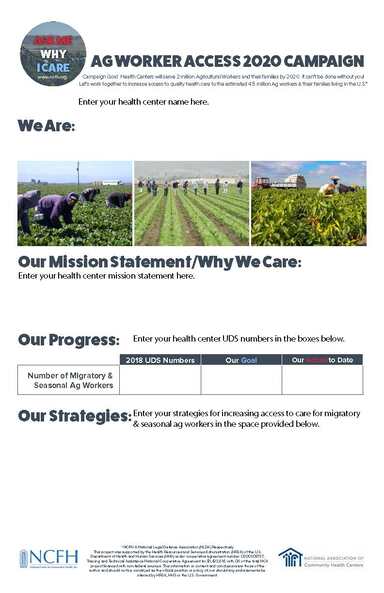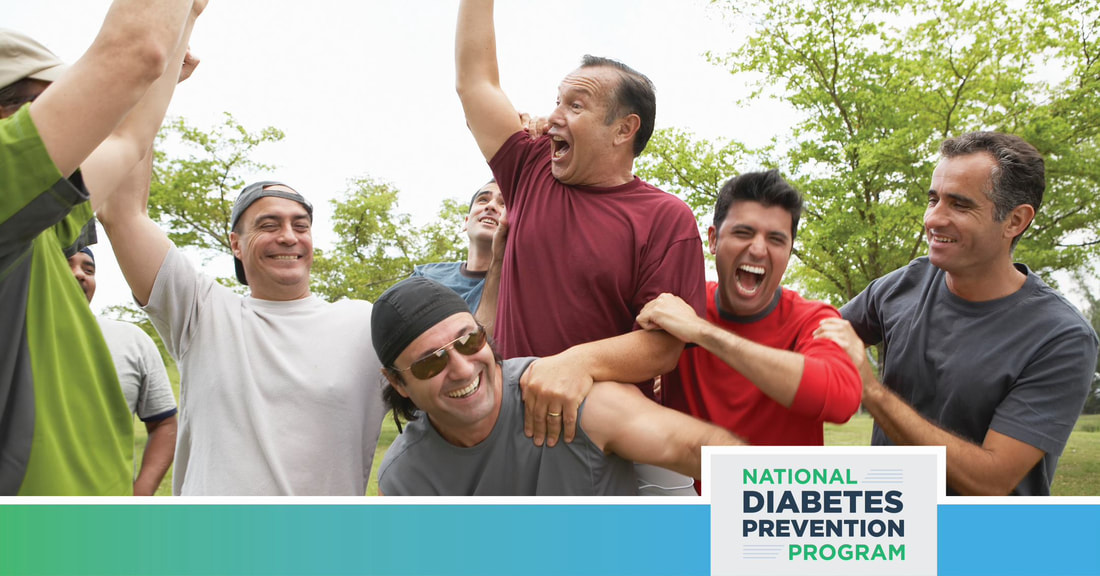|
The Ag Worker Access 2020 Campaign Goal & Status Tracking Tool is a template poster for individual health center tracking of Ag Worker Access 2020 Campaign goals & status. It is a visual template for health centers to use to keep staff and board engaged in increasing access to care for Ag workers and their families.
Suggested Uses: Post in staff common areas, share in Board and staff meeting packets and presentations ProTip: Purchase self-adhesive lamination sheets to place over the table in the Progress section or Purchase an inexpensive poster frame …then use a dry erase marker to update progress without having to print the poster each time! NCFH is pleased to announce that Family HealthCare Network (FHCN) is this year’s Increase Access to Care for Ag Workers (IAC) Program Promising Practices Award recipient, for their promising practice highlighting partnership development and innovative outreach. FHCN’s partnerships with the Ventanillas de Salud Resource Center, and a Cuadrillas program with Radio Campesino, resulted in outstanding community outreach! Together they:
About the IAC Program:
The Increase Access to Care for Ag Workers (IAC) Program is a learning collaborative that goes hand in hand with the Ag Worker Access 2020 Campaign, a national initiative launched in 2015 to increase access to quality healthcare for America’s Agricultural workers and their families. The IAC Program was designed to assist health centers in accurately identifying, registering and reporting their patients. Our Program members include Primary Care Associations (PCAs), Health Care Controlled Networks (HCCNs), and Health Centers (HCs). Our common goal for the Increase Access to Care Program is to continue to increase access to care for Agriculture workers in their service areas through sharing of knowledge, tools, and resources. For more inforamation about the IAC Program, contact us. June is Men’s Health Month, a time when men are frequently reminded to make an appointment with their doctor for a yearly checkup. And while you’ve probably added it to your to-do list – you did, didn’t you? – there is something you can do now, today, to get a sense of how healthy you are. The best part is you don’t even need to leave your house to do it. All you have to do is take a 1-minute online test to learn if you might have prediabetes.
Prediabetes is a condition that affects 84 million Americans – or 1 in 3 people – and it means that a person’s blood sugar levels are higher than normal but not high enough yet for a type 2 diabetes diagnosis. Think of when you play ball with two buddies – chances are one of you has the condition. Men are more likely to have prediabetes than women. The good news is it can often be reversed with a healthier diet and more physical activity. To take the 1-minute test, visit doihaveprediabetes.org. You’ll be asked a few simple questions about your health, such as how active you are, whether you have a family history of diabetes, and how much you weigh. Then the website will tally your points and tell you whether you’re likely to have prediabetes and be at high risk for type 2 diabetes. Of course, if you find out you have a high-risk score, you’ll want to make that appointment with your doctor. But for now, just taking the test can let you know where you stand. If you do have prediabetes, your doctor can recommend resources and programs to help you reduce your type 2 diabetes risk, including the National Diabetes Prevention Program. At CDC-recognized lifestyle change programs, participants work with a trained lifestyle coach to learn how to make healthier choices when it comes to physical activity, healthy eating, and managing stress. Bruce Wheeler, 52, Program Participant When my glucose levels and blood pressure started to increase, I knew I had to do something to reduce my risk of developing type 2 diabetes. When I mentioned my concerns to a friend, she told me about CDC-recognized lifestyle change programs. I love the support and encouragement I get from the other program participants and the lifestyle coach. I enjoy making lifestyle changes such as cutting back on red meat and sugary drinks. I now keep my bike at work and take lunch-break rides around town to stay active! If you do one thing this June for Men’s Health Month, take the one-minute prediabetes risk test at doihaveprediabetes.org. And tell a buddy or two to do the same. |
The National Center for Farmworker HealthImproving health care access for one of America's most vulnerable populations Archives
July 2024
Categories
All
|






 RSS Feed
RSS Feed